In this edition of Court Judgements, we look at Supreme Court’s judgements on right to recovery in motor accident claims, principles on ‘Right to Remain Silent’, Madras High Court’s judgement on coexistence of multiple ideologies, Bombay High Court’s judgement on custody of children among parents, and Delhi High Court’s judgement on marriage of consenting adults.
Supreme Court: The insurer is not entitled to recover solely on the grounds that the vehicle owner did not verify the driver’s license.
In IFFCO Tokio General Insurance Co. Ltd. vs. Geeta Devi and others, the apex court held that an insurance company cannot claim the right to compensation solely because the vehicle owner didn’t verify the driver’s license. The burden of proof lies on the part of the insurance company and not on the part of the vehicle owner.
The two-judge Supreme Court bench comprising Justice CT Ravi Kumar and Justice Sanjay Kumar was hearing an appeal by the insurance company against the judgement of the Delhi High Court that earlier reversed the order of the Tribunal granting the right of recovery to the insurance company. The matter in question pertains to a tragic accident in which an individual sustained fatal injuries due to the reckless and negligent operation of a Tempo vehicle. The legal beneficiaries of the injured party subsequently initiated proceedings by approaching the Motor Vehicle Claims Tribunal, seeking compensation for their loss. The Tribunal awarded compensation to them; however, it held that the insurance company was not liable to pay the compensation due to a breach of the terms and conditions of the insurance policy by the vehicle owner. The Tribunal, therefore, directed the petitioner-insurance company to deposit the awarded amount with the liberty to recover the same from the present owners of the Tempo. Upon approaching the Delhi High Court against the Tribunal order, the Delhi HC reversed the judgement. This is a challenge to that judgement.
The court looked at section 149 (2) (a)(ii) of the Motor Vehicle Act, 1988 which dealt with driver clause in third-party risks.
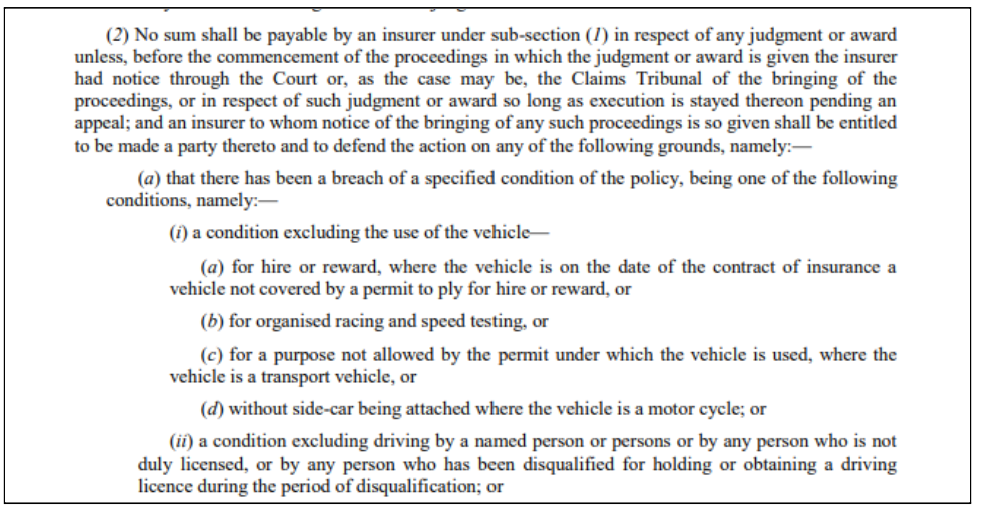
The court observed that there is no requirement under this clause that the owner of the insured vehicle must get the driver’s license verified by the concerned authorities. It further held that it is impossible for the vehicle owner to practically verify the genuineness of the driving license of every driver. The insurance company has also not shown any material evidence that shows a wilful breach by the vehicle owner and hence, the owner shall not be liable to pay compensation.
The apex court relied on the judgements in National Insurance Co. Ltd. vs. Swaran Singh and others and Ram Chandra Singh vs. Rajaram and others, whereby it was held that the insurance company’s exoneration was contingent upon the owner’s awareness of the driver’s fake license and their subsequent allowance of the driver to operate the vehicle. It was explicitly clarified that the mere existence of a counterfeit license, in and of itself, would not relieve the insurer of responsibility.
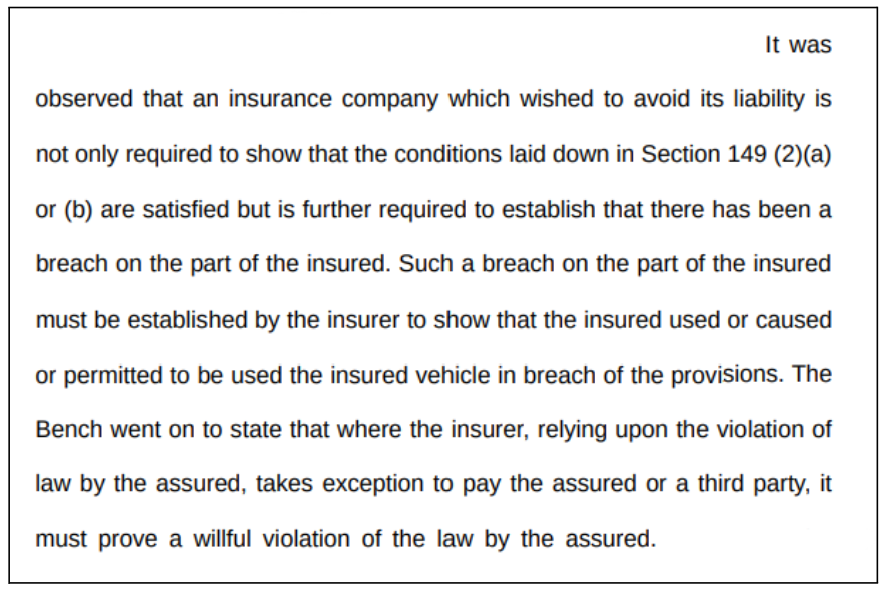
Accordingly, the court refused to interfere with the judgement of the Delhi High Court. Further, the court expressed shock at the insurance companies pursuing the matters till the last forums on well-settled legal propositions, thereby being responsible for unmindful wastage of valuable curial time and efforts. The petition is thereby dismissed.
Supreme Court: Balancing principles of privacy and the propositions of law with what is required under section 313 of Cr. P.C.- Apex court summarizes twelve points.
In IndraKunwar vs. The State of Chhattisgarh judgement where a woman was acquitted, who, earlier had been accused of murdering her own child and previously convicted, resulting in a life imprisonment sentence, the Supreme Court also deliberated on the requirements expected from the convict in her statement under Section 313 of the Code of Criminal Procedure (Cr.P.C). This consideration was made while considering the principles of privacy and established legal precedents.
The brief facts of the case are as follows. The convict had a relationship with a fellow villager, Baiga Gond, which led to her becoming pregnant. Subsequently, after giving birth, she was accused of killing the child and discarding the body in a small water body or pond. In her statement under Section 313 of the Code of Criminal Procedure (CrPC), the accused acknowledged her pregnancy. Based on this and some of the testimonies of the witnesses, the trial court convicted the woman under section 302 of the IPC, which the High Court also agreed to.
However, when the apex court took a different approach. It held that the trial court and the High Court erred in judgements while awarding life imprisonment. Such judgements need a due appreciation of evidence and cannot be awarded mechanically and in a perfunctory manner. This was not present in this case. The only appreciable evidence is the testimony of the woman under section 313 of CrPC. This raised the question of whether a female accused is obligated to divulge details pertaining to her personal life in the context of a criminal trial.
This appeal is considered by a two-judged bench comprising of Justice Abhay S. Oka and Justice Sanjay Karol.
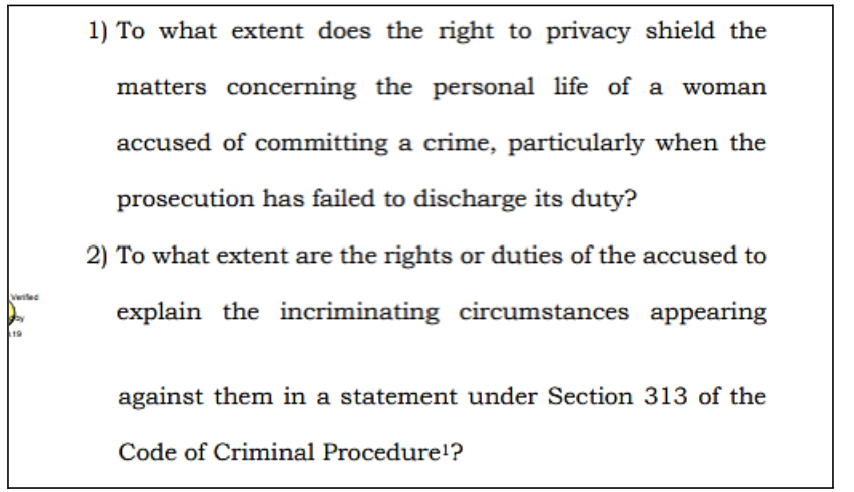
Keeping in mind the fundamental right to privacy and legal propositions around it, the court summarized 12 principles.
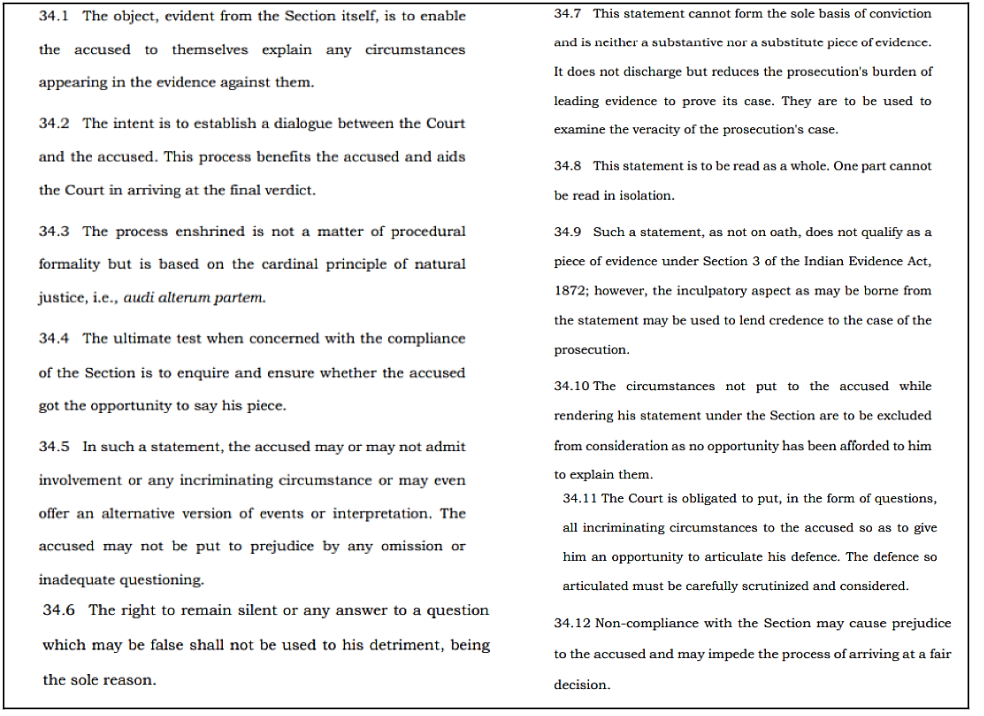
Further, as an answer to the question surrounding privacy and section 313 of Cr.P.C, the court held that even though the law requires disclosure of relevant information necessary for the resolution of a criminal case, such disclosure should not infringe upon the fundamental right to privacy.
Madras HC: No person in this country can have a right to propagate divisive ideas and conduct meeting to abolish or eradicate any ideology, co-existence is the key.
The Madras High Court held that the co-existence of multiple ideologies is an identity of the country, and no person shall be allowed to have a right to propagate divisive ideas while dismissing a petition that denied permission for a meeting to eradicate ‘Dravidian Ideology’.
In Mangesh Kartikeyan vs. The Commissioner of Police, the High Court bench comprising of Justice G Jayachandran was hearing a petition seeking permission to conduct an indoor meeting to eradicate ‘Dravidian Ideology’. This petition was based on an earlier order of the same court that allowed a person to conduct a meeting about Dravidian Ideology and views on it.
However, the court differentiated between both petitions. While the former was about expressing views on Dravidian ideology, the meeting in question is about eradicating it. Acceding to the present request would cause further disturbance to the peace and tranquillity of the public.

Further, the court also made some remarks against those in power. Instead of propagating views that divide people, they must concentrate on eradicating other social evils.
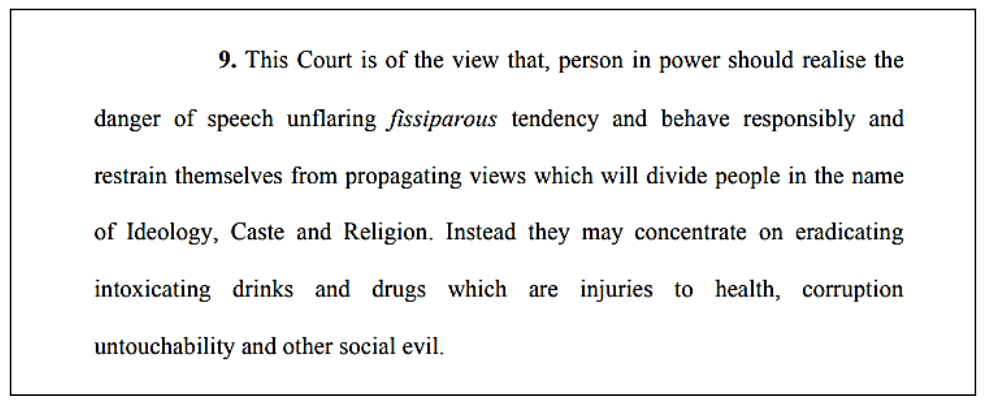
Accordingly, the petition is dismissed.
Bombay HC: The father of a child will not come within the scope of section of 361 of the IPC, even if he takes away the child from the keeping of the mother in absence of legal prohibition.
In ABC vs. XYZ, the Bombay High Court held that unless there is a legal prohibition from competent authorities, the father of a child is not said to be committing kidnapping and cannot be made guilty of an offence under Section 361 of the IPC.
The two-judge bench of Justice Valmiki SA Menezes and Justice Vinay Joshi was hearing an application seeking the quashing of FIR registered for the offence punishable under Sections 363 of the Indian Penal Code. A crime was registered on the biological father for forcibly taking away the minor son, thereby committing an offence of kidnapping.
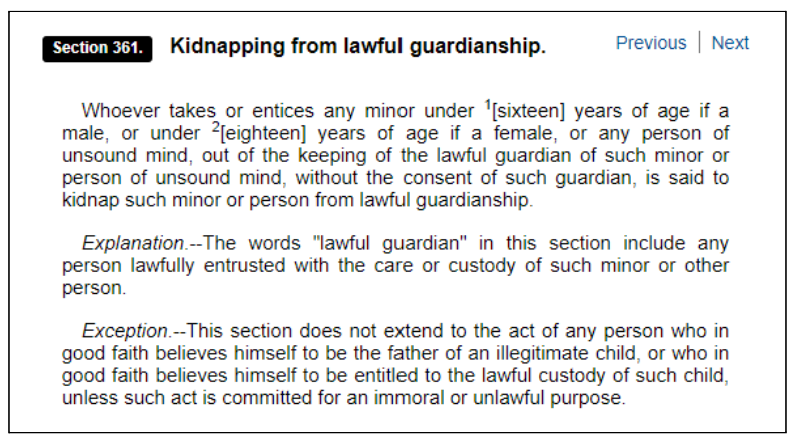
The court opined that for any offence to be accepted to be committed, it must not fall within the conspectus of the terms “lawful guardian”. The court also looked at the provisions of Hindu Minority and Guardianship Act, 1956, where section 6 clearly deals with the issue of natural guardians of the minors.
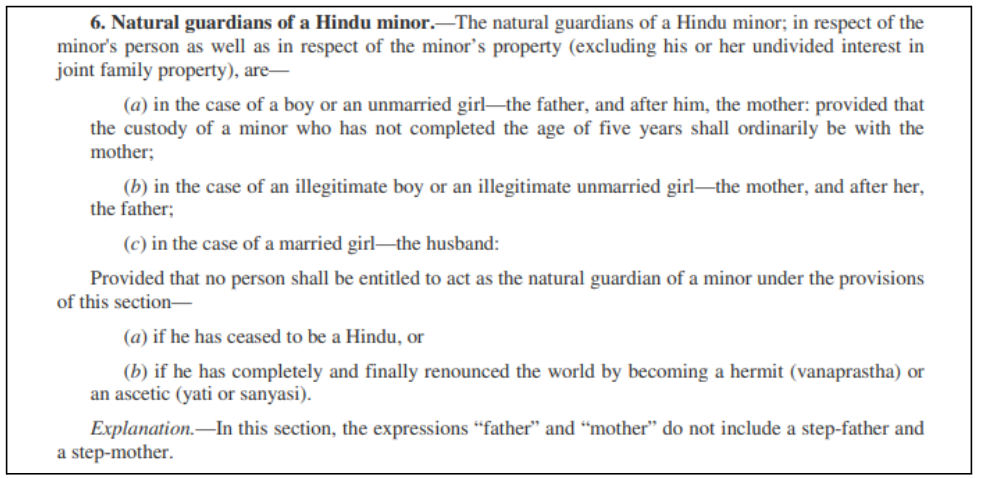
In the current case, the father becomes a natural guardian in the absence of the order otherwise passed by a Court of competent jurisdiction. The court further held that when the biological father removes the child from the mother’s custody, it can be viewed as a transfer of the child from the mother’s lawful guardianship to the father’s lawful guardianship. The natural father is considered a lawful guardian of the minor child, just like the mother. Therefore, it cannot be claimed that the father has committed an offense under Section 361 of the Indian Penal Code (IPC) that would make him liable to be punished under Section 363 of the Code of Criminal Procedure.
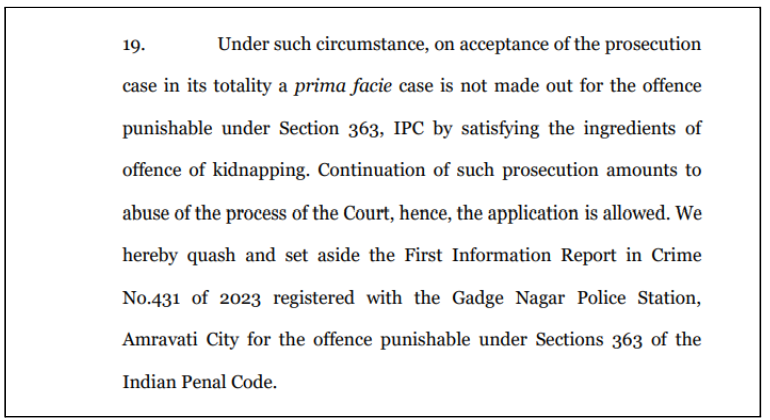
Accordingly, the application is disposed.
Delhi HC: No one has an authority to intrude into the lives of consenting adults who have willingly entered into a marriage. Article 21 encompasses the right to make personal choices.
In Md Nemat Ali and another vs. The State and Others, the Delhi High Court held that there is nothing left for anybody to interfere in the lives of two consenting adults who have chosen to marry. It further held that the right to make personal choices is covered under Article 21 and is an important aspect of human liberty.
The single-judge bench comprising Justice Saurabh Banerjee was hearing a petition seeking the issuance of a writ of Mandamus to provide protection to the petitioners against life and liberty threats from the family. The petitioners are both major adults and got married in accordance with the Muslim Law, and the marriage is duly registered thereafter. However, the petitioners’ parents started threatening other partner and their families of dire consequences as the marriage was solemnised against their wishes. Hence, this petition was filed.
The court heard the counsel for both sides. It held that the right to marry is an integral part of Article 21 and is a mark of human liberty.

It further relied on the judgement of the apex court in Shafin Jahan vs. Asokan K.M, where the similar issue of the right of every individual to marry a person of their choice was deliberated. It was held that the Constitution’s strength is evident in its assurance that every individual has a safeguarded right to make a choice of a partner for sharing intimacies, whether within or outside of marriage.
It is further held that the private and intimate aspects of marriage reside within a sacred sphere of privacy that is inviolable. An individual’s unassailable right to select a life partner remains unaffected by religious considerations. The law establishes conditions for a lawful marriage and offers solutions when relationships encounter difficulties. Neither the state nor the law can impose restrictions on the freedom of individuals to make choices about their partners. These choices are at the heart of personal liberty protected by the Constitution. Hence, the right to choose one’s life partner is an inherent aspect of Article 21 of the Constitution.
The Constitution upholds the right to life, and this right can only be restricted by a law that is both substantively and procedurally fair, just, and reasonable. Nonacceptance of the choice of individuals would simply mean creating discomfort to the constitutional right by a Constitutional Court which is meant to be the protector of fundamental rights. Such a situation cannot remotely be conceived. Furthermore, society should not have any influence in determining the selection of life partners.
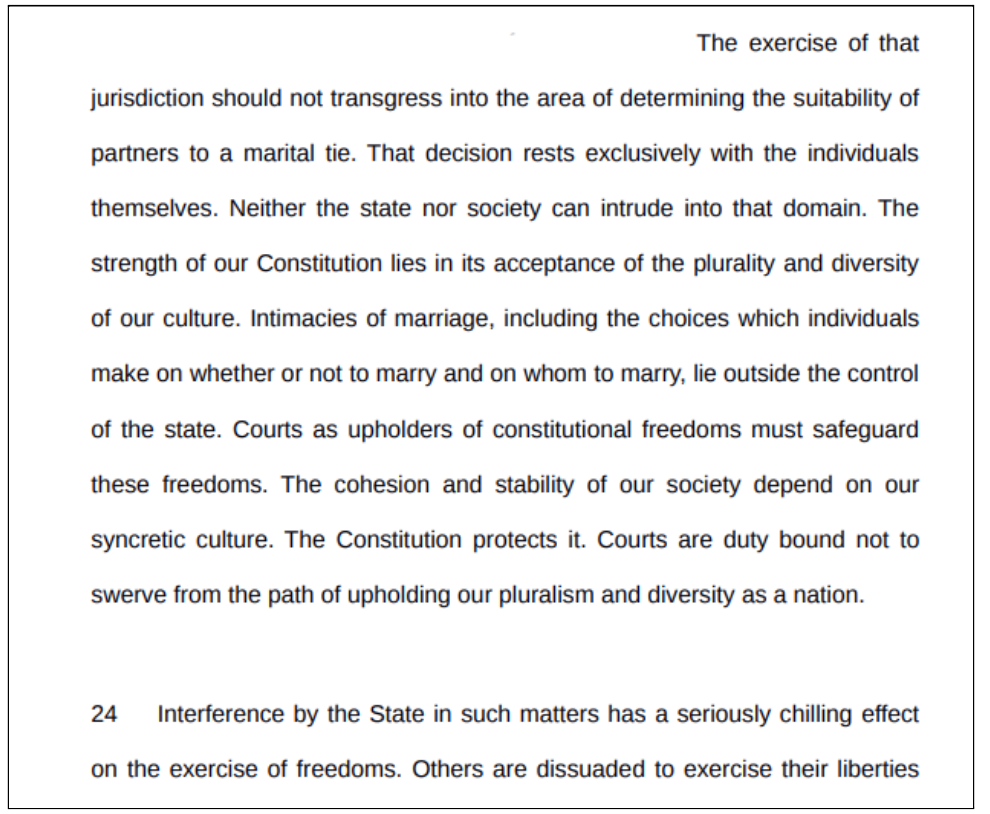
Accordingly, the court ordered the police to take all reasonable steps to ensure adequate assistance and protection to the petitioners in accordance with the law. Hence, the petition is disposed of.


